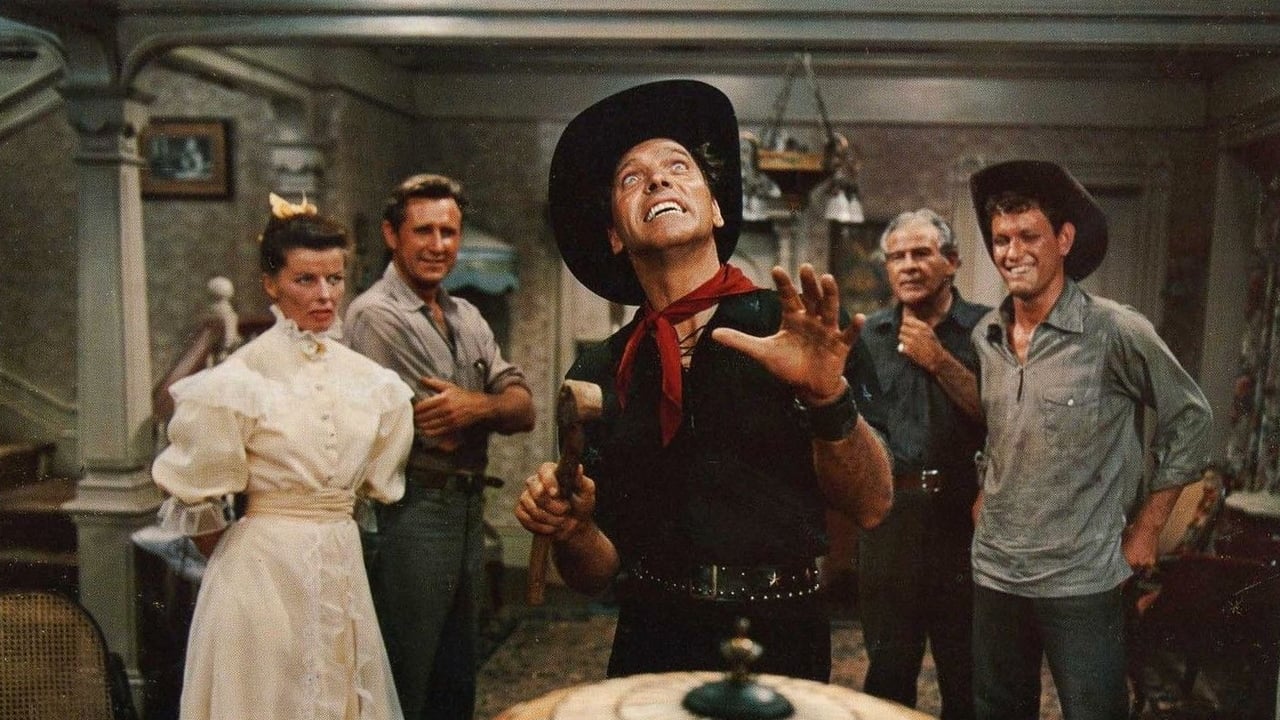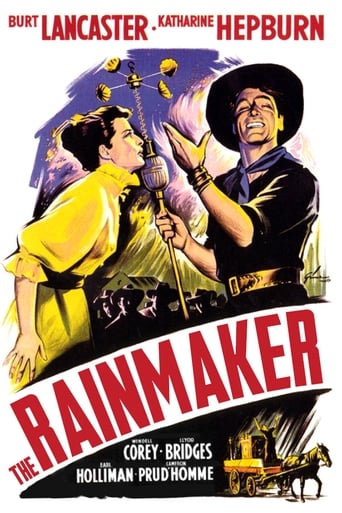

Critics,are you kidding us
... View MoreIt is not deep, but it is fun to watch. It does have a bit more of an edge to it than other similar films.
... View MoreThe film's masterful storytelling did its job. The message was clear. No need to overdo.
... View MoreLet me be very fair here, this is not the best movie in my opinion. But, this movie is fun, it has purpose and is very enjoyable to watch.
... View MoreNowadays the most recognizable movie called "The Rainmaker" is Francis Ford Coppola's adaptation of John Grisham's novel about a rookie lawyer taking on an insurance company. Another movie with that title was Joseph Anthony's adaptation of a play about a con artist who claims that he can cause liquid precipitation in a drought-stricken Kansas town during the Depression. I had never heard of the play before seeing the movie, but the movie is worth seeing. Not the greatest movie ever made, but I liked the complexity that it gave the characters. Burt Lancaster made one suave huckster, with Katharine Hepburn giving her usual smooth performance as a local woman looking for a relationship. As for Lloyd Bridges's character, I kept imagining him saying "Looks like I picked the wrong week to quit (insert moral vice)".All in all, a worthwhile movie. I've recently been making an effort to see a lot of older movies that received Academy Award nominations (this one received nods for actress and score).
... View MoreSpoilers. Observations. Opinions.Great Kate. Katharine Hepburn is the greatest. Here she is, just a few years after portraying the passenger of that African Queen, opposite that gritty, grimy Humphrey Bogart.Kate is wearing dresses here. This goes against her real life stereotype-shattering slacks, pants, man-clothes or whatever you want to call her personal wardrobe.Kate is Lizzie. Lizzie is a worn out spinster, wishing to be a Cinderella who is swept off her feet by a handsome prince from la-la land. She has romantic yearnings for a local snooze-fest, but he looks pretty boring to me.Voila! Along comes Burt Lancaster, portraying Starbuck. I immediately think, nowadays, of Starbuck's, the coffee purveyor. Anyway, this film's Starbuck is a dashing, swashbuckling snake oil salesman who says things like the stars shine for old maid Lizzie. Who else but Lancaster can play Starbuck? Starbuck is a loudmouth, wonderful, screaming and yelling dream come true, or so he thinks in his own mind.Awesome Burt. Burt Lancaster ain't no (bad English on purpose here) hard-boiled Spencer Tracy or dashing Cary Grant, but he is hubba-hubba in a very exciting way. Baby, the rain must fall, and neither Tracy nor Grant could ever have pulled it off.Lizzie is swept off her feet. The boring local guy is left covered by all of the dust in Starbuck's road. Katharine Hepburn, you have done it again. You have played many types of characters, and of course opposite several well known male lead actors. Starbuck, however, is one I remember very well. He is that sexy, risk-taking dreamer whom a woman really wants, deep down. A woman doesn't want to spend the rest of her life with a wrung-out old dishrag.Yes, the rainmaker makes the rain fall, in buckets as a matter of fact. Buckets the size of a house. This rainfall is huuuuuuuge. Starbuck (Lancaster) has made his prediction come true. He proceeds to sing, scream and yell that the rainfall has finally occurred. This is such a memorable scene.
... View MoreThe Rainmaker is directed by Joseph Anthony and written by N. Richard Nash. It stars Burt Lancaster, Katharine Hepburn, Wendell Corey, Lloyd Bridges, Cameron Prud'Homme and Earl Holliman. Music is by Alex North and VistaVision/Technicolor cinematography is by Charles Lang.Starbuck (Lancaster) is a conman who arrives in the little town of Threepoint and promises to deliver the rain to end the town's crippling drought problem. More telling, perhaps, will be his impact on the Curry family...N. Richard Nash wrote it as a television play and would then see it hit the Broadway stage, so he was the logical choice for screenplay duties here. The film very much feels like a play, with very pronounced acting and sharp dialogue, it's also - at just over two hours in length - far too long for a talky based production. Thirty minutes could quite easily have been shaved off here. There's also the contentious casting of the Oscar Nominated Hepburn, who in many people's eyes - myself included - is miscast and just doesn't sit right in the role, leaving it to Lancaster to bring the flight and breeze to light up the piece.However, to enjoy the art of acting brings some rewards, it's also a pic of crafty humour and features a story of considerable humane substance. That one man, a scallywag, can have such a positive impact on a sterile backwater family, builds nicely to an ending that is a complete joy, a real smile raiser. It's also handsomely photographed by Lang, the colour lensing so smooth, and the production design, backed up by North's most appealing musical score, ensures you know that the makers cared about what they were doing. Relationships on set were initially rocky, but the principal stars would come to be friends and speak fondly of their time on the film. 6/10Footnote: The material would also be turned into a musical titled 110 in the Shade.
... View MoreBased on a Richard Nash play and directed by Joseph Anthony, "The Rainmaker" stars Katharine Hepburn as an ageing spinster who's unluckiness with love have led to her becoming bitter, callous, cynical and skeptical of men. Mirrored to Hepburn is Starbuck, a character played by Burt Lancaster. He's a charming conman who promises - for a fee of course - to bring rain to the drought inflicted farmlands of superstitious suckers.The film delights in clashing Starbuck's optimism with Hepburn's pessimism. It's larger point, though, is that Hepburn's pessimism is both the result of her fierce intelligence and masks a deep, optimistic yearning. She's a hopeless romantic, always believes, is the film's true optimist, whilst it is Starbuck who cynically exploits others and has no faith in his abilities to conjure up rain. The film's end, of course, espouses a healthy merging of both stances.Today "The Rainmaker" is mocked for its wild, hysterical acting. It's a good example of a certain "type" of acting, though, and Hepburn's performance here was once frequently used to teach young theatre actors. Lancaster, meanwhile, is as over-the-top as always, his character imbued with the same manic energy which made his early action/adventure movies so memorable. Yes everyone in the film (Lloyd Bridges, Hepburn, Lancaster) is too old for their roles, the film's too theatrical, too on-the-nose, but Nash's script goes into some dark places, and scenes in which Hepburn lays bare her insecurities regarding her plain body, her fears of loneliness, her acceptance of her own virginity, are shockingly frank. Elsewhere the film does well to show how superstition and a kind of grim logic tend to both operate in the same space and facilitate each another. Starbuck's superstitions mask his weaknesses, his insecurity, his disbelief, whilst Hepburn's cold logic masks her longings, her fantasies, her private delusions. The film is ridiculously heavy-handed, but in its theatricality is able to sketch out regions which most art can't.7.9/10 - Worth one viewing.
... View More